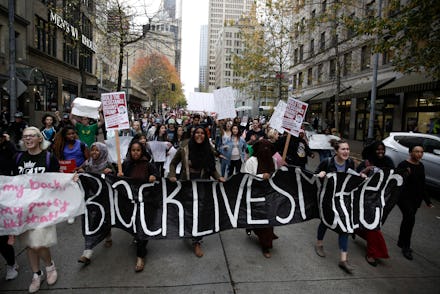How to support the Black Lives Matter movement as a white ally

The Black Lives Matter movement has changed the landscape of modern activism in recent years. Communities of color have organized themselves to speak up against issue like police brutality, mass incarceration and other forms of systemic racism.
Black Lives Matter describes itself as an "ideological and political intervention" of a system that continually devalues black lives. At the center of that intervention is dismantling white supremacy, or the idea that white lives and white people hold more inherent value than the lives of people of color.
White allyship, though it may sound difficult, is a key part of the fight against white supremacy. To learn more about how white people can contribute to the Black Lives Matter movement, Mic spoke to Heather Cronk, the interim co-director of Showing Up for Racial Justice, a national network of groups and individuals that organizes white people in the fight for racial justice.
There is a clear place for white people in this movement.
Many white people Cronk encounters feel like the movement for black lives is "not for them" and that they "don't see themselves in it," she said. But, that's simply not true.
"There's a clear role for white folks to play as part of a multiracial movement for racial justice," Cronk said in a phone interview. "Undermining and disentangling ourselves from white supremacy is something that benefits white people in addition to benefitting folks of color."
But, Cronk stressed, "part of the work is trusting black leadership" to direct white allies in ways that are helpful to the movement. Cronk laid out a few easy ways for white people to start finding their place in the movement: namely donating to a black-led organization and staying informed about the Black Lives Matter movement by reading works from writers of color.
Start with deepening your relationships with black people and other people of color.
White people must also work on their relationships with people of color, especially organizers.
"One of the most important things you can do as a white person is to build deep relationships with folks of color who you know but haven't had this relationship with or are doing organizing work in your community," Cronk said. "That's far more authentic than saying 'I'm ready to do work now' but not having relational context to that work. Being in deep and accountable relationships is essential to the work."
While it may be uncomfortable to broach topics like police brutality with your friends of color, white people have to get past their own fears.
"Systems of oppression rely on silence in order to exist," Cronk said. "It's important to have that conversation rather than not have it, even if that means you tumble all over yourself and you look awkward."
But don't rely on your friends of color to educate you.
People of color often take on the emotional labor of racism, but not every person of color is willing to do educate white people about racism.
In that case, Cronk says, if you want to have talks about race with black friends, you should ask for their consent first and let them know that the conversation can be on their terms.
"Assuming that you have the right to that knowledge is problematic, and not having a conversation about it because you're afraid you'll get it wrong is also problematic," Cronk said. "What keeps white people silent more often than not is a fear of getting it wrong."
In the meantime, check out this curriculum for white allies looking to learn about race and this Black Lives Matter syllabus from New York University, complete with videos and movies to watch.
Your work needs to start with your own family.
Talking about racism at the holiday dinner table may be difficult, but it has to be done.
It's important for white people to engage in anti-racist work to "come out" to their family and friends as people who are trying to fight white supremacy, as allies to black people and people of color.
"White folks who want to show solidarity with folks of color, yes you have to come out as being an anti-racist white person, and part of that is not opting out of that when it feels like it might be tough," Cronk said. "That's the privilege that allies to oppressed communities have."
Becoming an ally will be hard work, but it's worth it.
Cronk said that many white people have contacted Showing Up for Racial Justice since the ascendance of Donald Trump.
"We were hearing that from a lot of white folks who were newly politicized, who finally believed folks of color who were saying this is a racist country and that Donald trump embodies a lot of the white supremacy in the country, and that he is not an aberration," Cronk said.
Many have expressed hesitation on joining the movement because they don't know where to start — and don't want to do the wrong thing. But getting it wrong shouldn't be a part of the worry. White people shouldn't think of this as a "transactional" relationship where they are simply gaining knowledge about anti-racism, according to Cronk.
Even if you are afraid to "get it wrong," Cronk said, anti-racism work is worth it.
"Showing up for the humanity and dignity of people who you know and love and care about is worth it," Cronk said. "It's in our mutual interests."